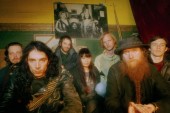'mimi-nashi hoichi' is 'hoichi the earless' , the doomed protagonist of the japanese ghost story of the same name. this, in english, appears as the first story in lafcadio hearn's 'kwaidan', and tells the story of a blind biwa player who is summoned by a spirit messenger to play before a royal court of ghosts. he recites for them the epic of a great battle at sea, using his biwa to ".sound like the straining of oars and the rushing of ships, the whirr and the hissing of arrows, the shouting and the trampling of men, the crashing of steel upon helmets, the plunging of slain in the flood". because he was blind, he could not know that he had not been conducted to a royal court of worldly splendor, but rather to a graveyard, where mortally alone he played amidst countless oni-bi, the spectral fires of the dead. when the priest of the temple where hoichi resided became aware of his blind friend's nocturnal sojourn, he ventured to save him from his haunting by inscribing in ink the text of the holy sutra 'hannya-shin-kyo' on hoichi's body, and bading him to remain completely still and silent at the event of his next summoning. to quote from hearn's footnote:
"Apropos of the magical use of the text, as described in this story, it is worth remarking that the subject of the sutra is the Doctrine of the Emptiness of Forms--that is to say, of the unreal character of all phenomena or noumena. .'Form is emptiness; and emptiness is form. Emptiness is not different from form; form is not different from emptiness. What is form--that is emptiness. What is emptiness, that is form. Perception, name, concept, and knowledge are also emptiness. There is no eye, ear, nose, tongue, body, and mind.'".
this inscription renders hoichi invisible to ghost retainer who comes to summon him, all, that is, but for his ears, which in oversight had not been incribed with scripture. so, as they were seen by the ghost retainer to be hovering disembodied in space, they were taken, that is they were torn from his head, thus stigmatizing him for antiquity.'hoichi the earless'.
soon after nnck's inception (1993) we inquired as to the japanese translation of the band's name, fascinated as we were then with hijo kaidan ('emergency stairs') and omoide hatoba ('harbor of memories'). We were told that that there was only a phonetic translation of the word 'blues', and that the concept, in japanese, was elusive. it was yamatsuka eye who half-jokingly suggested 'kubi-nashi hoichi' ('hoichi the neck-less') as a possibility, thus drawing our attention to the legend of hoichi and the resonance aspects of the story held with our approach to and experience of nnck.
"There is no eye, ear, nose, tongue, body, and mind.'".
and so, there is no neck.
